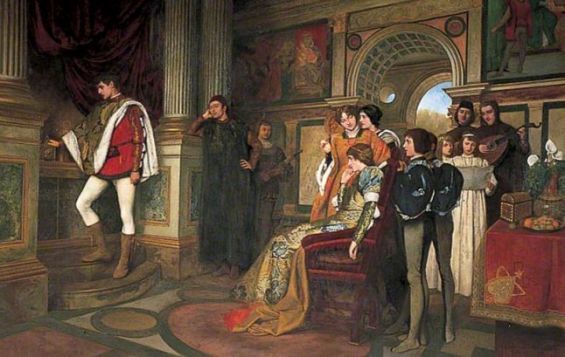In 1595, Saadi sultan Ahmed Al Mansour sent Caid Ahmed Ben Adel, a man he trusted, to lay the foundation stone of the Anglo-Moroccan Alliance against Spain. The two nations, five years later, signed the agreement with the help of Moroccan ambassador Abdelouahed Anoun, Rais Merzouk Ahmed Benkacem and Caid Ahmed Ben Adel.
Sultan Ahmed Al Mansour’s trusted man
Years after Portugal was defeated in the Battle of the three kings in 1578, the Saadi sultan and the Queen of England were ready to collaborate. «Political relations were strengthened as a result of reciprocal diplomatic missions and were crowned with an Anglo-Moroccan alliance against Spain in the reign of Philip II», wrote Moroccan historian Khalid Ben-Srhir in «Britain and Morocco during the embassy of John Drummond Hay 1845-1886» (2005, Routledge Curzon, translated by Malcolm Williams and Gavin Waterson).

However to conclude the above-mentioned agreement, Ahmed al-Mansour sent his principal secretary who became later ambassador to the court of Queen Elizabeth I of England in 1600. Lawful to the orders of the Saadi sultan, Abd el-Ouahed ben Messaoud ben Mohammed Anoun visited London alongside a delegation which sailed to promote the new alliance and negotiate a joint invasion of Spain.
On the 1st of February, 1574, Abdallah al-Ghalib, the second Saadi sultan died, leaving the throne to his brother Abd Al Malik aka Abu Marwan. However, Mohammed Al Moutawwakil Al Maslukh dethroned his uncle Abd Al Malik. The latter rebelled against his nephew, seeking the help of Portugal and a battle erupted where three kings fought to the death.
Their armed conflict was known to historians as the battle of Alcácer Quibir. Sultan Mohammed Al Moutawwakil, King Sebastian of Portugal and Abd Al Malik were killed in the battle and Ahmad Al Mansour ascended the throne.

The Saadi Court’s problems did not end there as Al Mansour’s nephew claimed the throne. According to Moroccan historian Mohamed Nabil Mouline, Moulay En-Nasser showed up in the summer of 1595, occupying Taza and eastern Morocco. In his book «The Sherifian Sultan – The Religious and Political Roots of the Moroccan State» (Rabat’s faculty of Letters, 2013), Mohamed Nabil Mouline referred to Caid Ahmed Ben Adel who will be later named Morocco’s ambassador to England by Al Mansour.
«When Sultan Ahmad Al Mansour knew about the invasion on June the 25th, 1595, he sent one of his trusted men, Caid Ahmed Ben Adel with dozens of men to the Crown Prince (Mohamed Cheikh Mohamed Cheikh El Mamoun, Saadian Sultan in Fes from 1604 to 1613)».
Caid Ahmed Ben Adel, Shakespeare’s «Merchant of Venice»
On the other hand, Gitanjali Shahani reports in his book «Emissaries in Early Modern Literature and Culture: Mediation, Transmission, Traffic, 1550-1700» (Routledge, 2016) that Al Caid Ahmed Ben Adel had led a diplomatic mission to England in 1595.
He was «accompanied by two other caids (leaders of the corsairs who attacked European shipping vessels in the Mediterranean and Atlantic) and a 'retinue' of twenty five or thirty people». «Perhaps England was negotiating a secret agreement with the very pirates who attacked European ships. Or perhaps there was discussion of mutual support against Spain», he wondered.

Meanwhile, historian Nabil Matar gives more details on Ben Adel’s diplomatic mission. In his book «Turks, Moors, and Englishmen in the Age of Discovery» (Columbia University Press, 2000), he believes «the visitors were caids».
«Was England entering into secret negotiations with the Barbary Corsairs - to the extent of welcoming them openly in the metropolis ? According to the Fugger informant, who disliked the English for their piracy and pillaging, the answer was affirmative», he wrote, confirming the fact that London was also negotiating a secret agreement with Moroccan corsairs.
But as Nabil Matar points out, there is little information on Ben Adel’s visit to London. But one thing is certain : just like the visit of Abdelouahed Anoun or Mohamed Ben Hadou's, Caid Ahmed Ben Adel’s voyage drew the attention of Londoners, he added.
He also believes that just like Abdelouahed Anoun, the Moroccan ambassador Ben Adel had inspired William Shakespeare for the writing of one of his famous playwrights. In fact Gitanjali Shahani thinks that «the Prince of Morocco», a character in William Shakespeare’s «The Merchant of Venice» is inspired entirely by Caid Ahmed Ben Adel.





 chargement...
chargement...













